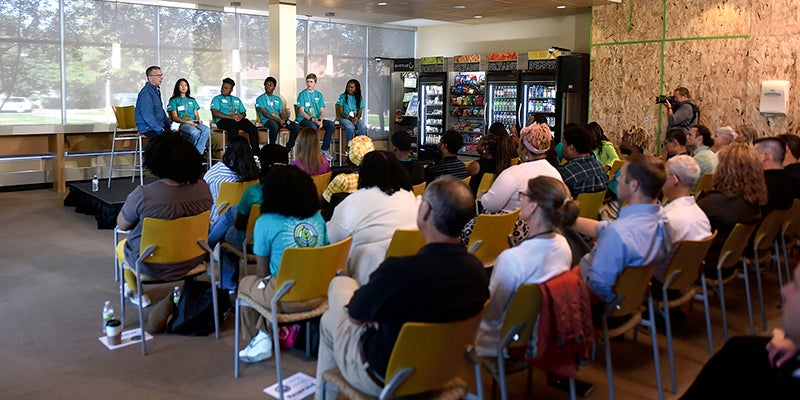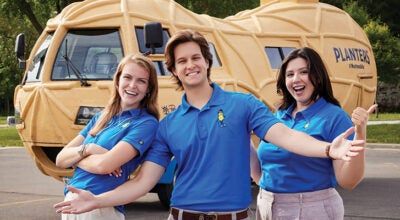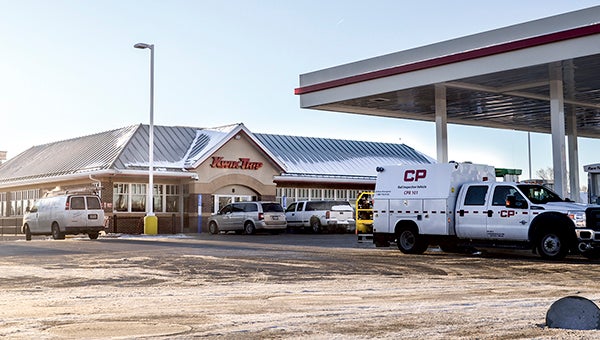Skippy leads the way at shareholders meeting
Published 10:55 am Wednesday, January 30, 2013

Hormel Foods CEO Jeff Ettinger holds a press conference before the annual shareholders meeting Tuesday night at Austin High School. -- Eric Johnson/photodesk@austindailyherald.com
Hormel had a banner 2012, but is looking to the future
Click here: Striking P9 union calling for retirement benefits for workers; Humane Society praises Hormel
Hormel had a pretty busy year in 2012, but its CEO Jeff Ettinger pointed to a 2013 acquisition as one of the company’s biggest recent achievements.

Becci Smith distributes programs to shareholders before the Hormel annual shareholders meeting Tuesday night at Austin High School.
Hormel Foods Corp. had a record year in total sales and profit in 2012, announced its 47th-consecutive annual stock dividend increase, and reached $2 billion in sales for new products since 2000. But the acquisition of the Skippy peanut butter brand announced on Jan. 3 got the most attention Tuesday night at the company’s annual shareholders meeting at Austin High School’s Knowlton Auditorium.
“Skippy didn’t happen during the fiscal year, but it was too exciting not to talk about,” Ettinger said to laughter and applause in the auditorium filled with more than 1,000 stockholders.
The $700 million acquisition, which will finalize in the U.S. on Thursday, garnered national attention earlier this month and was Hormel’s largest buy in history. Hormel expects annual Skippy sales of about $370 million, with almost $100 million of that from outside the United States, a figure which would increase the company’s international division’s sales by 30 percent. The $270 million in domestic sales would be the most for all of Hormel’s grocery division products, which includes Spam and Hormel Chili.
At a press conference before the meeting, Ettinger outlined the company’s plan for Skippy in 2013 and 2014, saying they plan to cross promote it with their other products, and to look for innovative ways to sell and package it.
“I think the mission for the first couple years in the U.S. is to get our hands around the brand,” he said. Internationally, he sees it growing at a much faster rate.
“Once we close on that part of the deal, we expect to continue driving growth in such markets as Canada, China, and other Asian markets,” he said.
The company has had significant success in the past decade acquiring companies, merging them with Hormel’s existing products and growing them. The company bought Jennie-O in 2001, Farmer John in 2004, Valley Fresh in 2006, MegaMex Foods and all of its Mexican food subsidiaries in 2009, and Country Crock in 2010, just to name a few. But Ettinger said he’s less concerned about the company growing too large, and more focused on keeping a family feel.
“There’s no magic number,” Ettinger said about how big is too big for the company. “One of the things I think about and talk about with our team is to make sure we keep the family feeling, to make sure we keep a lean organization where everyone has a lot of access to the decision makers within the company. We’ve had excellent success in growing.”
Ettinger says they expect continued growth of 5 percent in sales and 10 percent in earnings per year.
“We’re pretty much right on it,” he said. “We have had success in the past in growing through new product innovation, through acquisitions and doing a better job with some of the existing products.”
The company also lauded reaching its “Go for $2B by 2012” goal, which called for $2 billion in total sales of new products since 2000. The achievement is even more impressive, Ettinger said, considering the company had total sales of $8.2 billion in 2012.
The most successful new products include Hormel party trays, Hormel Natural Choice deli meats, Hormel Compleats microwave meals and Jennie-O Turkey Store oven ready items and turkey burgers.
Hormel also released the amount it donated for hunger relief in 2012; a total of $3.2 million in the U.S. and internationally, especially Guatemala, and including $220,000 to fight hunger in 22 of its plants’ communities. The company gave more than $5 million in 2011 as part of its “On Our Way to Ending Hunger” program.
The meeting’s featured presentation came from Phillip Minerich, vice president of Hormel’s research and development. The department has more than 100 scientists working in Austin and about 100 outside the U.S. handling roughly 300 projects at any given time.
2012 was a year of achievements and milestones for Hormel. Here are some of the highlights:
—Hit a record $8.23 billion in total sales, up 4 percent from 2011 and 43 percent since 2006, when it made $5.75 billion.
—Topped $500 million in profit for the year, also an all-time record. It was the fourth-consecu-tive year profits increased, and it was a huge jump from the $286 million in 2008.
—Met its goal of $2 billion in total sales from products created since 2000.
—Announced its 47th-consecutive annual dividend increase, this time jumping from 60 to 68 cents per share.
—Had its 74th-straight year of sharing profit with its employees, divvying a record $17 million just before Thanksgiving.
—Celebrated 75 years of Spam in July. The company introduced a new marketing campaign in conjunction with the milestone led by spokes-character ‘Sir-Can-A-Lot,’ and created two new flavors of Spam, black pepper and jalapeño.
—Honored I.J. Holton, the company’s sixth CEO, who died in April. Austin Public Schools honored the Hormel leader by naming its new fifth- and sixth-grade school after him.
—Announced Jeff Ettinger was one of four CEOs nationally to be named Responsible CEO of the Year by Corporate Responsibility magazine.
—Ranked No. 19 on the Corporate Responsibility list nationally, and was the top Minnesota company on the list.






